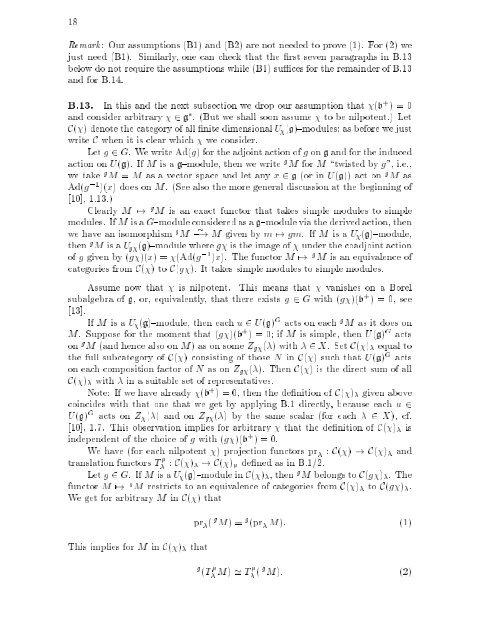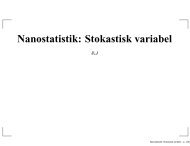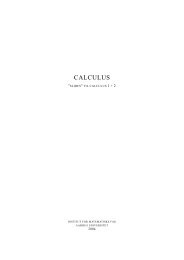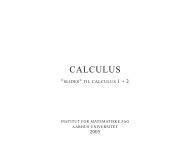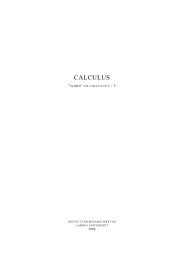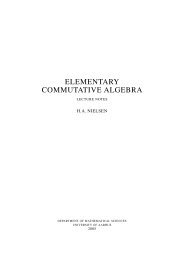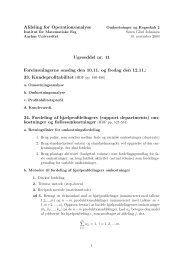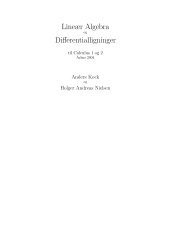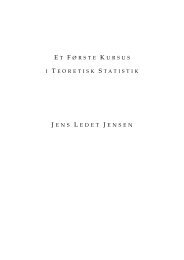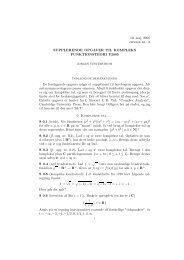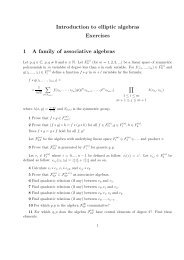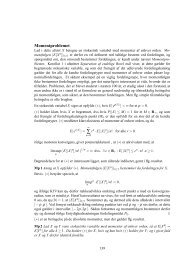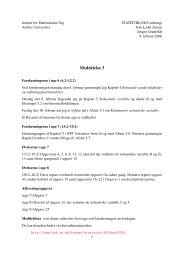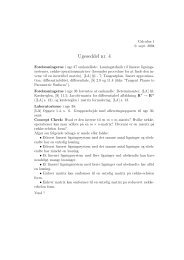subregular nilpotent representations of lie algebras in prime ...
subregular nilpotent representations of lie algebras in prime ...
subregular nilpotent representations of lie algebras in prime ...
Create successful ePaper yourself
Turn your PDF publications into a flip-book with our unique Google optimized e-Paper software.
18<br />
Remark: Our assumptions (B1) and (B2) are not needed to prove (1). For (2) we<br />
just need (B1). Similarly, one can check that the rst seven paragraphs <strong>in</strong> B.13<br />
below do not require the assumptions while (B1) su ces for the rema<strong>in</strong>der <strong>of</strong> B.13<br />
and for B.14.<br />
B.13. In this and the next subsection we drop our assumption that (b + )=0<br />
and consider arbitrary 2 g .(Butwe shall soon assume to be <strong>nilpotent</strong>.) Let<br />
C( ) denote the category <strong>of</strong> all nite dimensional U (g){modules; as before we just<br />
write C when it is clear which we consider.<br />
Let g 2 G. We write Ad(g) for the adjo<strong>in</strong>taction<strong>of</strong>g on g and for the <strong>in</strong>duced<br />
action on U(g). If M is a g{module, then we write g M for M \twisted by g", i.e.,<br />
we take g M = M as a vector space and let any x 2 g (or <strong>in</strong> U(g)) act on g M as<br />
Ad(g ,1 )(x) doesonM. (See also the more general discussion at the beg<strong>in</strong>n<strong>in</strong>g <strong>of</strong><br />
[10], 1.13.)<br />
Clearly M 7! g M is an exact functor that takes simple modules to simple<br />
modules. If M is a G{module considered as a g{module via the derived action, then<br />
we have an isomorphism g M ,! M given by m 7! gm. IfM is a U (g){module,<br />
then g M is a Ug (g){module where g is the image <strong>of</strong> under the coadjo<strong>in</strong>t action<br />
<strong>of</strong> g given by (g )(x) = (Ad(g ,1 )x). The functor M 7! g M is an equivalence <strong>of</strong><br />
categories from C( )toC(g ). It takes simple modules to simple modules.<br />
Assume now that is <strong>nilpotent</strong>. This means that vanishes on a Borel<br />
subalgebra <strong>of</strong> g, or, equivalently, that there exists g 2 G with (g )(b + ) = 0, see<br />
[13].<br />
If M is a U (g){module, then each u 2 U(g) G acts on each g M as it does on<br />
M. Suppose for the moment that (g )(b + )=0;ifM is simple, then U(g) G acts<br />
on g M (and hence also on M) as on some Zg ( )with 2 X. Set C( ) equal to<br />
the full subcategory <strong>of</strong> C( ) consist<strong>in</strong>g <strong>of</strong> those N <strong>in</strong> C( ) such thatU(g) G acts<br />
on each composition factor <strong>of</strong> N as on Zg ( ). Then C( ) is the direct sum <strong>of</strong> all<br />
C( ) with <strong>in</strong> a suitable set <strong>of</strong> representatives.<br />
Note: If we have already (b + ) = 0, then the de nition <strong>of</strong> C( ) given above<br />
co<strong>in</strong>cides with that one that we get by apply<strong>in</strong>g B.1 directly, because each u 2<br />
U(g) G acts on Z ( ) and on Zg ( )by the same scalar (for each 2 X), cf.<br />
[10], 1.7. This observation imp<strong>lie</strong>s for arbitrary that the de nition <strong>of</strong> C( ) is<br />
<strong>in</strong>dependent <strong>of</strong> the choice <strong>of</strong> g with (g )(b + )=0.<br />
We have (foreach <strong>nilpotent</strong> ) projection functors pr : C( ) !C( ) and<br />
translation functors T : C( ) !C( ) de ned as <strong>in</strong> B.1/2.<br />
Let g 2 G. IfM is a U (g){module <strong>in</strong> C( ) ,then g M belongs to C(g ) . The<br />
functor M 7! g M restricts to an equivalence <strong>of</strong> categories from C( ) to C(g ) .<br />
We get for arbitrary M <strong>in</strong> C( ) that<br />
This imp<strong>lie</strong>s for M <strong>in</strong> C( ) that<br />
pr ( g M)= g (pr M): (1)<br />
g (T M) ' T ( g M): (2)


